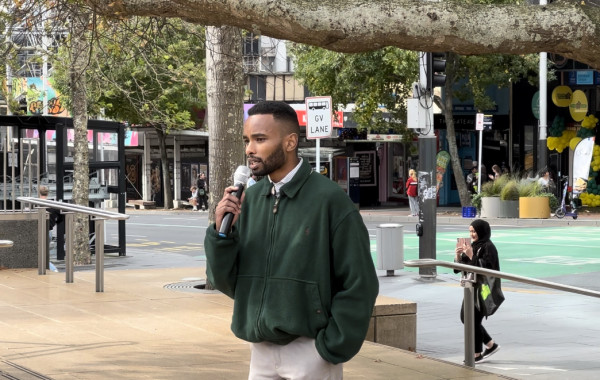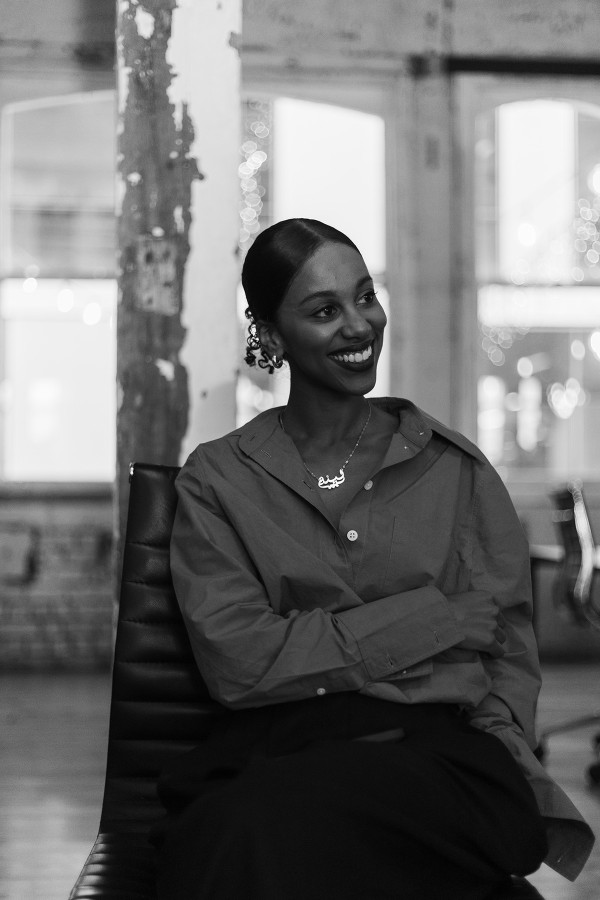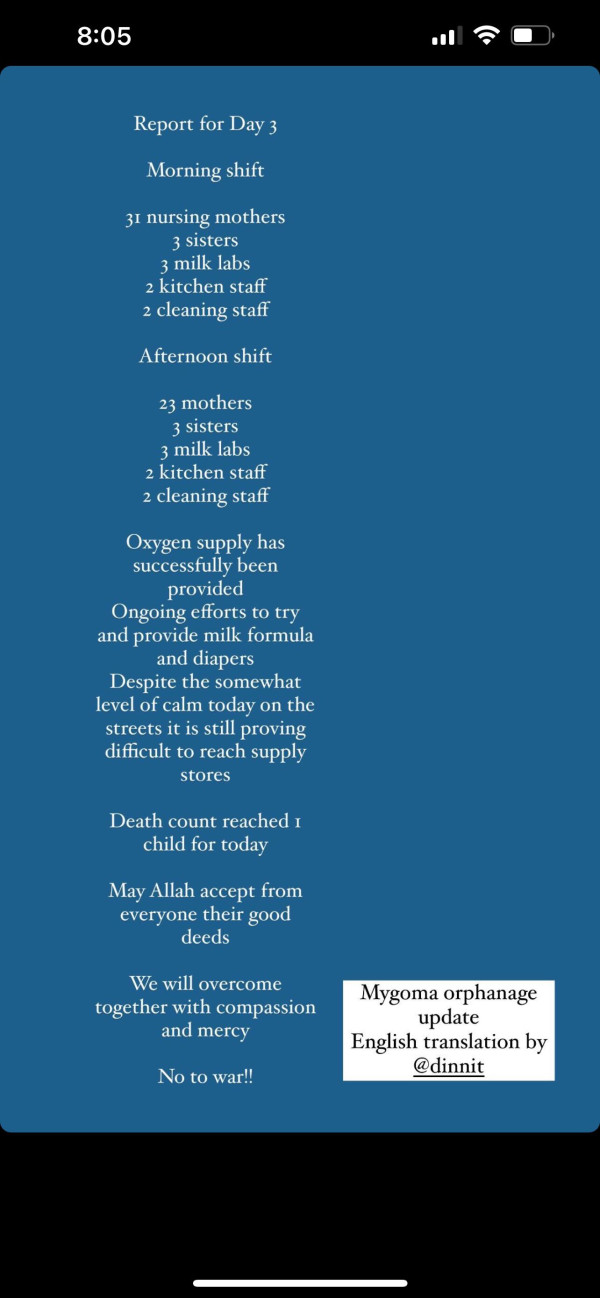For more than two weeks, Rahman Bashir has been both anxious at the crisis unfolding in Sudan and appalled at the lack of action from the New Zealand Government to condemn it.
The urban planner for Auckland Council has a lot of his family in the North African nation and felt so frustrated, he organised a demonstration at Aotea Square last Saturday to raise awareness and support.
“We feel very neglected, we feel unseen, unheard, unrecognised; because of how this crisis is being viewed,” he says.

Rahman Bashir speaking at a demonstration in Aotea Square, Auckland.
According to Bashir, the lack of concern for Sudan - which has been caught in a violent war since April 15 - stems from an expectation that this is the normal standard of life for African people.
"People expect us to have these crises. It’s expected for war to happen, for famine to happen, for humanitarian crises to happen.”
Bashir says the response, or lack of, from the New Zealand government has been appalling.
He wants to see a special refugee category established for Sudanese people that’s similar to the one created for Ukrainians fleeing the Russian invasion.
“While the Ukraine war is a valid reason to create special refugee categories, we’ve not even had a statement from our foreign minister, referencing the crisis at hand, let alone trying to create a clear refugee pathway for Sudanese people,” says Bashir.
Rahman Bashir and his father. (Photo: Supplied)
It’s been a heartbreaking time for Bashir, especially as the security situation in Sudan unravels.
“The RSF went to one of the most high security prisons in Khartoum and released prisoners. We’ve heard stories from people here in our community, where they’ve had loved ones go into their house, and they’re either asked to leave or killed,” he says.
Once allies, now rivals
Sudan is caught in a violent struggle between two top military commanders.
The capital Khartoum is at the centre of the conflict between Sudan’s Armed Forces (SAF), led by army chief General Abdel Fattah al-Burhan and the Rapid Support Forces (RSF), a paramilitary unit led by chief Mohamed Hamdan Dagalo, also known as Hemedti.
The RSF were formerly part of the Janjaweed militia which has been accused of carrying out atrocities in the Darfur region.
Both men were allies in pushing out former long-time president Omar al-Bashir but their relationship fell apart as they tried to navigate the transition to a civilian-led democracy.
Fending for themselves
The violence has left the civilians of Khartoum stranded within their own homes, with fighter jets bombing parts of the city and street battles making it too dangerous to go outside.
The World Health Organization reported at least 413 people had been killed and 3551 had been injured up until April 26. The real number of dead is expected to be much higher.
Access to food and water are scarce, while major power outages within Khartoum have left most with no access to internet or electricity.
Healthcare workers are currently trapped by the fighting, stretching their scarce resources as much as they can.
It’s estimated at least 70% of hospitals in Khartoum and neighbouring states have stopped functioning, leaving staff and patients trapped with no supplies to treat people with.
With no functioning airport or healthcare system and aid agencies unable to operate within Sudan, young people and the diaspora have stepped in to help provide logistical support.
Helping from afar
Leena Kheir is part of the Sudanese diaspora who has been impressed by the ways in which young Sudanese are fending for themselves in a situation she describes as a humanitarian crisis of epic proportions.
The Sudanese multi-disciplinary creative - who grew up between Aotearoa and Qatar - says she and others have been using social media to provide evacuation points and practical information to help people get out.
“They’re creating shared google drives with interactive maps of where to find food and water and where soldiers have been spotted. They are screenshotting current bus and van schedules and sharing them on Instagram with the hashtag #keepeyesonsudan,” she says.
“I shared one just the other day with a friend who was asking about how to get to Egypt from a certain place and she sent it to her family in Sudan. They actually managed to hitch a ride from one of those members. This network of consistent sharing is actually making a difference.”
Leena Kheir (Photo: Supplied)
Struggle to get out
The evacuation process for people in Sudan has also been extremely difficult, chaotic and strenuous, says Kheir.
People reported having to pay for buses out of the city, sometimes at huge prices.
“What we’re finding is that after making this arduous journey, they’re not being treated as refugees in a humanitarian crisis. They need to be treated like humans, not like a growing problem,” Kheir says.
Then there’s the orphanages.
“Young volunteers have also drawn attention to the fact that there are orphanages with 300-400 babies and children that no longer have access to wet nurses or even people to feed them bottles. These children are now being taken care of by volunteers,” says Kheir.

Kheir is incredibly proud and amazed by the coordination of the young people in Sudan.
“The entire diaspora is looking at them with a sense of awe and gratitude, for helping in ways we could never imagine.
“To organise mass evacuations over Twitter and WhatsApp, anyone who sees that understands that these are not an ordinary people,” she says.
While she’s impressed by the efforts of people stuck inside Sudan, she uses her artwork to express her frustrations with the current situation.
View this post on Instagram
View this post on Instagram
“Historically, art has always been present in times of revolution. It helps to capture feelings of rage, of discontent, of awe, of hope. And I think that in times of crisis, you still need to capture those same feelings. Art helps people to imagine a way forward.”
For Bashir, the violence happening in his family’s country now is completely unprecedented.
He says safety is now the biggest hope they have for the future.
“In an ideal world, if we dare to dream, we want peace. A democratic government. A future that is prosperous for our country, a future that can actually tap into the potential of Sudanese people. These are distant dreams at the moment. For the time being we want safety for our people.”
More stories:
The challenges and joy Black women in NZ face when it comes to their hair
“I want to see the celebration and inclusion of black hair and its natural form."
‘It’s like the Muslim Met Gala’: Tāmaki Makaurau celebrates Eid Al-Fitr
"The build up for the Eid ‘fit is extra exciting because it’s a day when we wear our best clothes."
What it means to be from Tūhoe
“ Just like riding horses and going hunting, and yeah…feel like I’m a Māori”